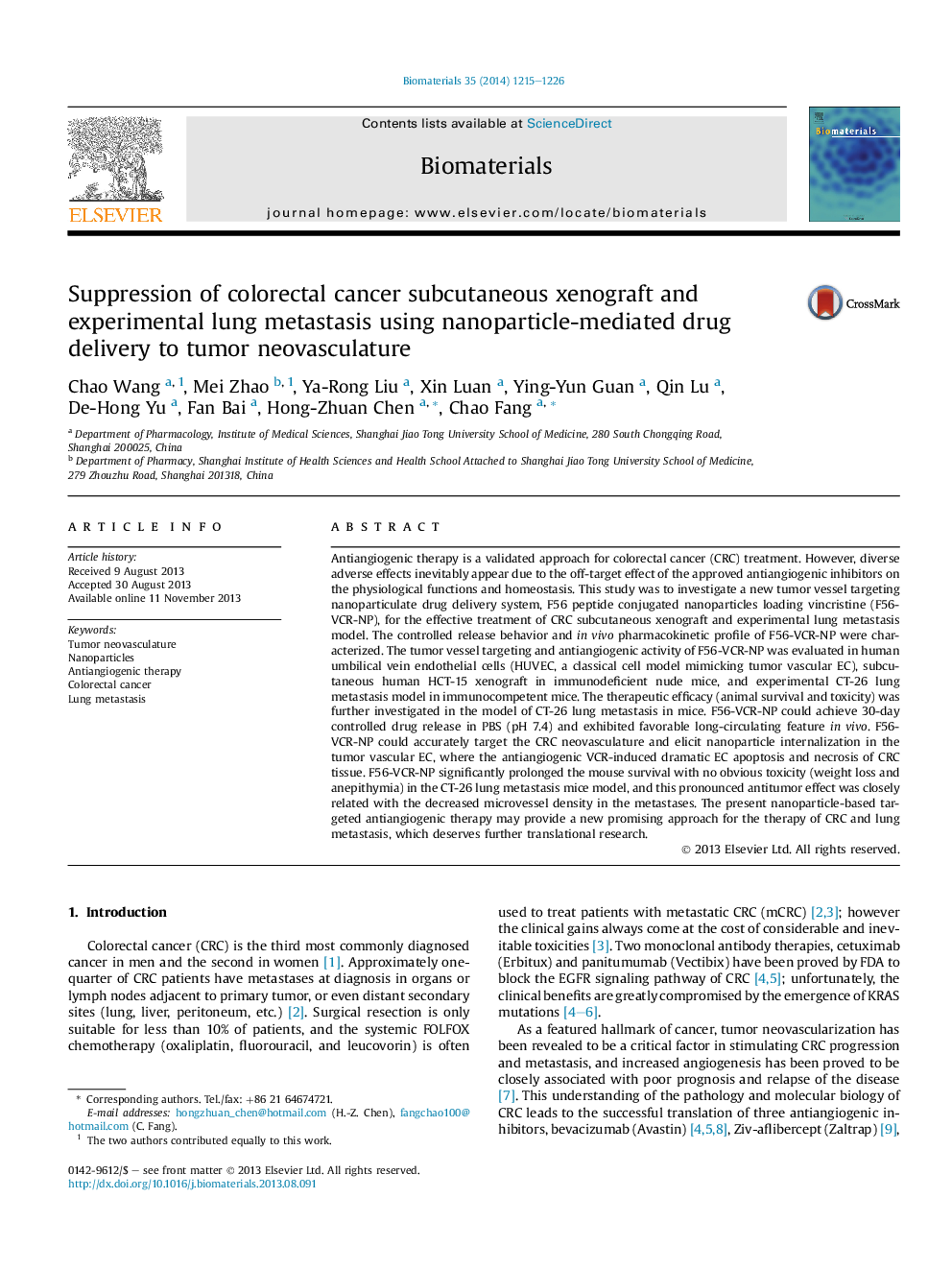| کد مقاله | کد نشریه | سال انتشار | مقاله انگلیسی | نسخه تمام متن |
|---|---|---|---|---|
| 10228593 | 486 | 2014 | 12 صفحه PDF | دانلود رایگان |
عنوان انگلیسی مقاله ISI
Suppression of colorectal cancer subcutaneous xenograft and experimental lung metastasis using nanoparticle-mediated drug delivery to tumor neovasculature
ترجمه فارسی عنوان
سرکوب سرطان کولورکتال، زنجرواتفت زیر جلدی و متاستاز ریوی تجربی با استفاده از تحویل دارو به وسیله نانوذرات به نئوواسکولاتور تومور
دانلود مقاله + سفارش ترجمه
دانلود مقاله ISI انگلیسی
رایگان برای ایرانیان
کلمات کلیدی
موضوعات مرتبط
مهندسی و علوم پایه
مهندسی شیمی
بیو مهندسی (مهندسی زیستی)
چکیده انگلیسی
Antiangiogenic therapy is a validated approach for colorectal cancer (CRC) treatment. However, diverse adverse effects inevitably appear due to the off-target effect of the approved antiangiogenic inhibitors on the physiological functions and homeostasis. This study was to investigate a new tumor vessel targeting nanoparticulate drug delivery system, F56 peptide conjugated nanoparticles loading vincristine (F56-VCR-NP), for the effective treatment of CRC subcutaneous xenograft and experimental lung metastasis model. The controlled release behavior and in vivo pharmacokinetic profile of F56-VCR-NP were characterized. The tumor vessel targeting and antiangiogenic activity of F56-VCR-NP was evaluated in human umbilical vein endothelial cells (HUVEC, a classical cell model mimicking tumor vascular EC), subcutaneous human HCT-15 xenograft in immunodeficient nude mice, and experimental CT-26 lung metastasis model in immunocompetent mice. The therapeutic efficacy (animal survival and toxicity) was further investigated in the model of CT-26 lung metastasis in mice. F56-VCR-NP could achieve 30-day controlled drug release in PBS (pH 7.4) and exhibited favorable long-circulating feature in vivo. F56-VCR-NP could accurately target the CRC neovasculature and elicit nanoparticle internalization in the tumor vascular EC, where the antiangiogenic VCR-induced dramatic EC apoptosis and necrosis of CRC tissue. F56-VCR-NP significantly prolonged the mouse survival with no obvious toxicity (weight loss and anepithymia) in the CT-26 lung metastasis mice model, and this pronounced antitumor effect was closely related with the decreased microvessel density in the metastases. The present nanoparticle-based targeted antiangiogenic therapy may provide a new promising approach for the therapy of CRC and lung metastasis, which deserves further translational research.
ناشر
Database: Elsevier - ScienceDirect (ساینس دایرکت)
Journal: Biomaterials - Volume 35, Issue 4, January 2014, Pages 1215-1226
Journal: Biomaterials - Volume 35, Issue 4, January 2014, Pages 1215-1226
نویسندگان
Chao Wang, Mei Zhao, Ya-Rong Liu, Xin Luan, Ying-Yun Guan, Qin Lu, De-Hong Yu, Fan Bai, Hong-Zhuan Chen, Chao Fang,
